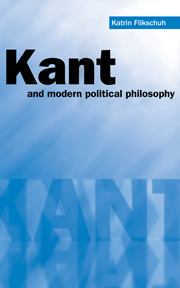Book contents
- Frontmatter
- Contents
- Acknowledgements
- List of Kant's works and abbreviations
- Introduction
- 1 Kantian metaphysics in contemporary liberalism
- 2 The metaphysics of freedom as an idea of reason
- 3 The morality of external freedom
- 4 The Lex Permissiva: property rights and political obligation in the Rechtslehre
- 5 The general united will and cosmopolitan Right
- 6 The metaphysics of Kant's cosmopolitanism
- Select bibliography
- Index
1 - Kantian metaphysics in contemporary liberalism
Published online by Cambridge University Press: 22 September 2009
- Frontmatter
- Contents
- Acknowledgements
- List of Kant's works and abbreviations
- Introduction
- 1 Kantian metaphysics in contemporary liberalism
- 2 The metaphysics of freedom as an idea of reason
- 3 The morality of external freedom
- 4 The Lex Permissiva: property rights and political obligation in the Rechtslehre
- 5 The general united will and cosmopolitan Right
- 6 The metaphysics of Kant's cosmopolitanism
- Select bibliography
- Index
Summary
Human reason has this peculiar fate that in one species of its knowledge it is burdened by questions which, as prescribed by the very nature of reason itself, it is not able to ignore, but which, as transcending all its powers, it is also not able to answer.
(CPR, avii)INTRODUCTION
This chapter pursues two principal aims. The first is to assess the recent reception of metaphysics, especially of ‘Kantian metaphysics’, in contemporary liberalism. The second aim is to sketch a metaphysical framework for analysing Kant's account of political obligation in the Rechtslehre. As regards the first aim, I focus on the liberal theories of John Rawls and Jürgen Habermas. Not only are these two thinkers dominant figures in current liberal thinking – but their approaches to justice and political justification are also deeply in influenced by Kant, albeit in very different ways. However, I do not offer a detailed discussion of their respective theories; my intention is merely to consider their views on the role of metaphysics in political thinking.
With regard to the second aim of this chapter, I draw on Stephan Körner's recent analysis of the structure and function of metaphysics in general. In adapting Körner's analysis to the political context I first contrast his account of metaphysics in terms of a person's categorial framework with Rawls' most recent view of it as the expression of an individual's private beliefs about the world.
- Type
- Chapter
- Information
- Kant and Modern Political Philosophy , pp. 12 - 49Publisher: Cambridge University PressPrint publication year: 2000



